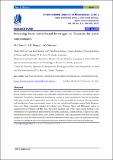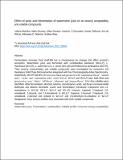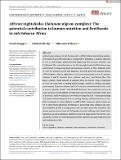Search
Now showing items 1-6 of 6
Screening local cereal-based beverages in Tanzania for yeast contaminants
(International Journal of Biosciences, 2021-02-26)
During spontaneous fermentation of cereals; yeasts ferment carbohydrates to produce alcohol and they also
provide vitamins, amino acids, peptides, and nucleotides needed by lactic acid bacteria as well as produce flavour ...
Effect of lactic acid fermentation of watermelon juice on its sensory acceptability and volatile compounds
(Elsevier Ltd., 2021-10-01)
Fermentation increases food shelf-life but is characterized by changes that affect product's perception. Watermelon juice was fermented with Lactobacillus plantarum (WJ-LP), L. rhamnosus (WJ-LR), L. casei (WJ-LC), L. brevis ...
African nightshades (Solanum nigrum complex): The potential contribution to human nutrition and livelihoods in sub-Saharan Africa.
(John Wiley & Sons, Inc., 2021-05-03)
Achieving zero hunger in sub-Saharan Africa (SSA) without minimizing postharvest losses of agricultural products is impossible. Therefore, a holistic approach is vital to end hunger, simultaneously improving food security, ...
Risks of aflatoxin exposure among adolescents in boarding schools in Kilimanjaro region, Tanzania
(Wageningen Academic Publishers, 2021-04-12)
School feeding in low-income countries is dominated by cereals and legumes, which are susceptible to aflatoxin contamination but are usually not assessed for aflatoxins. A cross sectional study was conducted to assess ...
Chapter 8 - Current trends and opportunities of plant-based non-alcoholic probiotic beverages: A European and African perspective
(Elsevier, 2021-05)
Although dairy-based foods have been the main probiotic food sources, a range of plant-based products are currently being developed to meet the needs of vegetarians, lactose intolerant persons, individuals on low cholesterol ...
Health Benefits of Antioxidative Peptides Derived from Legume Proteins with a High Amino Acid Score
(MDPI, 2021-02-20)
Legumes such as soybean, chickpea, lentil, cowpea, and mung bean, are valuable sources
of protein with a high amino acid score and can provide bioactive peptides. This manuscript presents
a review on legume-derived ...






